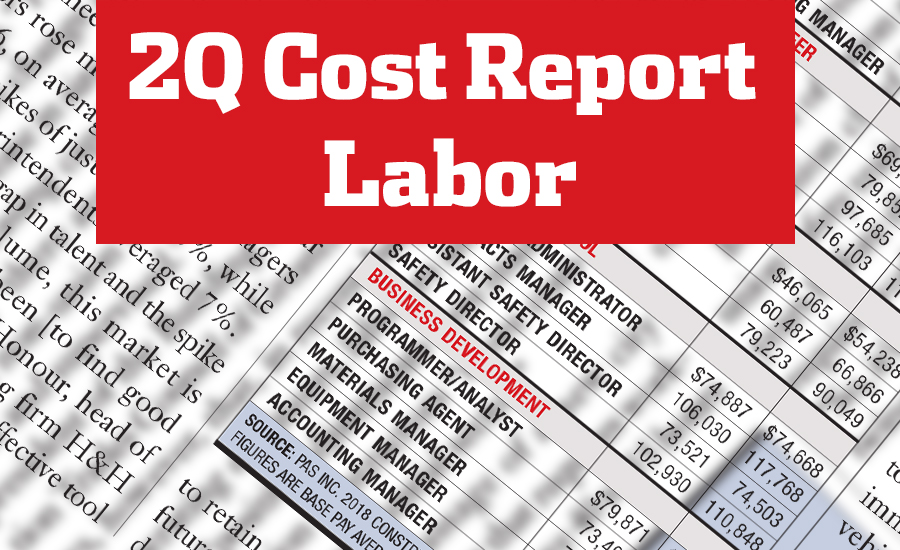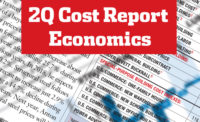While demand for experienced construction professionals runs high in many sectors, average compensation remains soft following the uncertainty created by the COVID-19 pandemic.
In 2020, base salary raises for construction staff averaged 3.6%, down from 3.9% in 2019, according to industry data from compensation consultant Personnel Administration Services. However, that yearly average was skewed by the fact that nearly half of raises were given in January and February, prior to pandemic-related work stoppages, says Jeff Robinson, PAS president.
Going into 2021, the compensation data shows that more employers are willing to give raises, while staying conservative on the level of increases. Last year, 11% of employers froze salaries, while in 2021 only 4% report they are not giving raises, according to the PAS statistics. “Historically, that is at the low end,” Robinson points out. “In a typical year, we’d expect between 4% and 7% to freeze pay.”
Related link: ENR 2021 2Q Cost Report PDF
(Subscription Required)
Financial Pressure
Employers report that they anticipate offering 3.2% bumps in base pay for 2021, however, Robinson says that he anticipates the actual percentage offered to be around 3.5% by the end of the year. “We feel that a lot of companies are starting to open up in terms of what they are offering,” he adds.
Still, companies clearly face some financial pressure when it comes to compensation. Robinson notes that bonuses, when calculated as a percentage of base pay, have been dropping for the past three years for most staff-level positions. Project superintendents saw their bonuses as a percentage of base pay peak in 2017 at 16.6%. In 2020, by comparison, these dropped to 13.7%. “Clearly, there’s only so much for pay, so how you divvy it up becomes a company’s prerogative,” he says.
Inflation could also be a strain on compensation, especially for firms that are affected by the recent rises in materials costs. “If you’re stuck without an escalator clause on some jobs, that money has to come from somewhere,” Robinson says.
Inflation affects employees as well, adding pressure on employers to keep salaries at a healthy level. The U.S. Bureau of Labor Statistics reported that the Consumer Price Index increased by 5% in May over a 12-month period—the largest increase since August 2008. “We would never recommend tying your pay increases to CPI, but we do know that companies consider that,” Robinson says.
Talent Strategies
Attracting talent to fill positions is another big draw on compensation strategies for industry companies. Salary offers to recruit employees are high, while available staff-level job candidates are in short supply, according to Bob Honour, president of H&H Consultants.
“This is the hardest I’ve seen it since I started in the 1980s to get people interested in an opportunity,” he adds. “There just aren’t enough people willing to move [to a new company].”
Most industry positions are in demand, particularly field staff such as project managers and superintendents. Candidates with experience in the multifamily residential and light industrial sectors are even more desirable.
Honour, who works primarily in the southeastern U.S., says that in Atlanta, project managers could command between $110,000 and $145,000, while in Charlotte, N.C., the range is $100,000 to $135,000. “We see lead superintendents with multifamily [residential] experience negotiating in the $140,000 range and up,” he says. “Two years ago, that would have been very rare.”
Short Supply
Estimators also remain in short supply. While an estimator with less than three years of experience might have earned $65,000 to $70,000 in a region a few years ago, candidates are commanding $75,000 and up now.
“I see young estimators asking for $95,000 only two years out of college, and they think they can get it because they know someone else who did,” Honour points out.
Megan Morris, vice president at recruiter Adams Consulting Group, says that while demand is high, she sees more candidates who are willing to make a move to a new employer after a year of hunkering down during the pandemic.
In some cases, seeing how their managers or employers responded during the past year of uncertainty may be driving those decisions by employees. “I get the sense that people watched how leadership reacted [during the pandemic],” Morris contends. “The sense of team was lost for a lot of people, and those [managers] who weren’t good leaders lost a lot of team members this year.”
Regardless of the financial pressures that employers may be facing ahead, Morris makes it clear that they can’t ignore the pressing need for talent in many sectors. “Employers aren’t being skittish,” she says. “They are moving forward. They need people and they will pay” to get them.


.jpg?height=200&t=1640294268&width=200)

